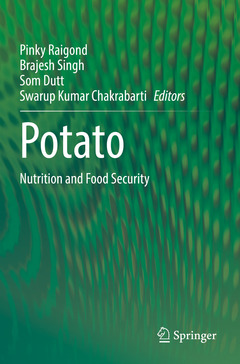Description
Potato, 1st ed. 2020
Nutrition and Food Security
Coordinators: Raigond Pinky, Singh Brajesh, Dutt Som, Chakrabarti Swarup Kumar
Language: English
Subjects for Potato:
Publication date: 10-2021
287 p. · 15.5x23.5 cm · Paperback
Publication date: 10-2020
287 p. · 15.5x23.5 cm · Hardback
Description
/li>Biography
/li>Comment
/li>
This informative book focuses on the nutritional value of potatoes and ways to improve it. With the world reeling under the burden of an ever-growing population, there is a pressing need for affordable and nutritious staples to feed the billions. Potatoes are grown in a broad range of countries around the world and can substantially contribute to future food security. Given the increasing consumption of potatoes, there is a need for a book that compiles information on and raises awareness of their nutritional value, while also encouraging their consumption. The respective chapters of this book cover the chemical composition, structure and health benefits of potatoes, as well as genetic modifications used to alter the concentration of relevant chemical compounds in them.
The book provides an overview of potatoes as a nutrient-dense crop, and discusses important aspects such as the role of potatoes in human diet, how they can improve the overall health of individuals, their role in addressing malnutrition etc. Its chapters deal with topics such as carbohydrates and glycemic index, dietary fibers, vitamins, proteins, phenols, carotenoids, anthocyanins, minerals, lipids, glycoalkaloids, new health-promoting compounds, the composition and utilization of potato peel, nutritional significance of potato products, and potato probiotics.Given its scope, the book will be of interest to undergraduate students, graduate students and researchers in plant physiology and biochemistry, plant genetic engineering, the food sciences and agriculture, as well as industry partners in related fields.
Dr. Pinky Raigond, Scientist, Division of CPB & PHT, ICAR-Central Potato Research Institute has specialized in the area of Plant Physiology. She has significantly contributed in the area of nutritional quality of potatoes, identification/quantification of health promoting compounds in potatoes, development of antioxidant rich, low glycaemic and flavoured potatoes for speciality sector, processing industry waste utilization for development of eco-friendly nanoparticles, disposable biodegradable tableware and biodegradable active packaging films, processing technologies for the entrepreneurs and potato post harvest management. Her research work is published in high impact journals. She is recipient of ‘Young Achievers’ Award’ and Young Woman Scientist Award.
Dr. Brajesh Singh, Principal Scientist & Head, Division of CPB & PHT, ICAR-Central Potato Research Institute has specialized in the area of Plant Physiology. He has made significant contribution in the area of development and refinement of potato storage technologies at farm and cold store level; processing technologies for the entrepreneurs; establishing the quality and nutritional laboratory; and development of protocols for nutritional profiling of potatoes. He is recipient of Associateship of National Academy of Agricultural Sciences and HSI-Dr. JC Anand Gold Medal for his work on Post-Harvest Technology. He is the Fellow of Indian Society for Plant Physiology, New Delhi; The Indian Academy of Horticultural Sciences, New Delhi; and Indian Potato Association, Shimla.
Dr. Som Dutt, Principal Scientist, Division of CPB&PHT, ICAR-Central Potato Research Institute, has specialized in the area of Plant Biochemistry and Molecular Biology. During 2002 - 2014 he worked at CSIR-Institute of Himalayan Bioresource Technology as Scients/Senior Scientist. He has made signigficant contribution in the aere of developmental biology of potato and important medicinal p
Provides exhaustive and up-to-date information on potatoes‘ nutritional value
Discusses the latest research on genetic modifications to enhance nutrient value
Sheds light on different nutrients present in the crop, health benefits and biofortification strategies
These books may interest you

Potato Breeding: Theory and Practice 210.99 €



